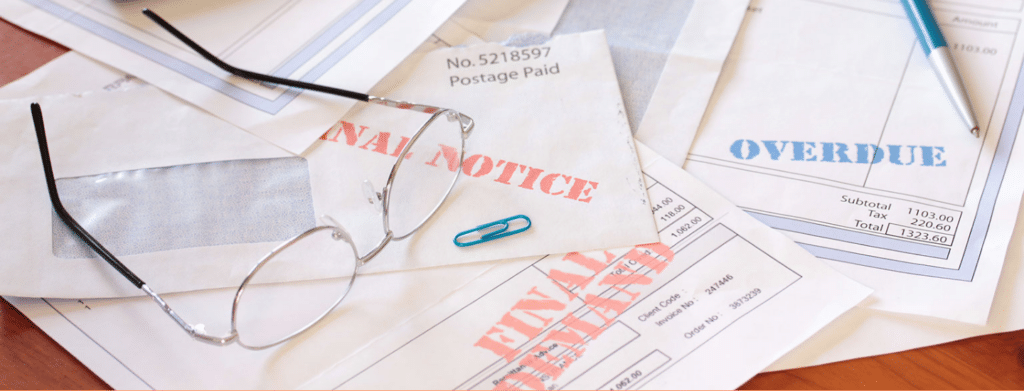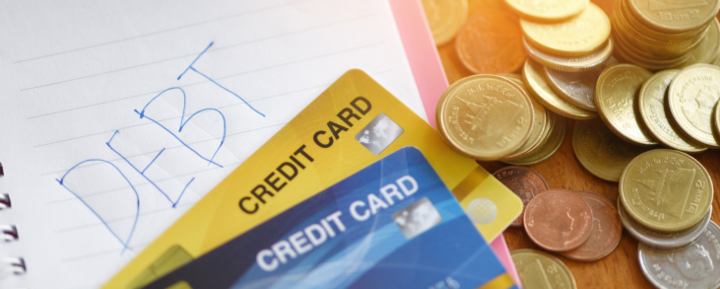Defaulting on credit card debt is something you want to avoid. Of course, sometimes the unexpected happens, and you may face financial hardship, making it difficult to stay on top of credit card bills.
Learning how to prevent credit card default is important if that’s the case. Or, if you’ve already defaulted on your credit card payments, how can you resolve the problem and get your finances back on track? Here’s what you should know.
What Does it Mean to Default on Credit Card Debt?
Before we get into what happens when you default on credit card debt, let’s take a quick look at what that means in the first place.
When a borrower initially “defaults” on credit card debt, they’ve failed to make the minimum required payments to the lender for a certain period. That period is typically 60 to 180 days, depending on the credit card company’s policy.
The consequences of defaulting on credit card debt can be quite serious:
Consequences of Defaulting on Credit Card Debt
- Late fees and increased interest rates: If you miss a payment, the credit card company will likely charge you a late fee. Moreover, if your missed payment is more than 60 days past the due date, the company can increase your interest rate to a higher penalty rate. This can add to the overall balance you owe. It can make it even tougher to control your credit card debt.
- Damaged credit score: Late payments will be reported to the credit bureaus and negatively impact your credit score. Since payment history accounts for 35% of your credit score, timely payments are crucial. Additionally, a default will remain on your credit report for seven years.
- Collection efforts: If your account remains in default for an extended period, the credit card company might eventually charge off and close your account. They can send your balance to an internal collections department or collection agency. The collector will then take over the efforts to recover the past due money you owe.
- Legal action: If collection efforts are unsuccessful, the credit card company or the collection agency might sue you for the unpaid credit card balance. If they win the lawsuit, they could pursue wage garnishment. They can freeze your bank account or seize your assets to repay the debt.
- Increased financial stress: Defaulting on your credit card bills can lead to increased financial stress due to the constant calls from debt collectors, threats of lawsuits, and the impact on personal and financial relationships.
How to Avoid Defaulting on Credit Card Debt
If you’re finding it hard to meet your credit card monthly payments, here are some steps you can take to avoid defaulting:
- Put together a budget. Defaulting on credit card debt is often a symptom of overspending. This is the case because you don’t have a clear idea of where your money is coming from and going. So start by assessing your income and expenses and then create a basic budget. This can help you adjust to free up funds for credit card payments.
- Prioritize payments. If you have multiple credit card debts, prioritize paying off those with the highest interest rates. Doing so will reduce the total interest you’ll pay over time. If the interest rates are about the same on all your credit cards, consider the smallest balances to pay off the debts sooner.
- Always make the minimum payments. Even if you can’t pay your balance in full, at least pay the minimum due. On-time payments will keep your account in good standing. Set up auto payments so you remember to make the payments due on your credit cards.
- Contact your credit card issuer. If you need help making payments, contact your credit card issuer immediately. They may be able to offer you a hardship plan. These plans can include temporarily lowering your interest rate, reducing your minimum payment, or even deferring payments.
- Consider debt consolidation or a balance transfer. If you have debt on several credit cards, consider consolidating your debt with a personal loan or transferring your balances to a card with a lower interest rate. Remember that you generally need good credit to qualify for these options.
- Increase your income. Increasing your income is another way to come up with more cash flow to put toward debt repayment. This could mean asking for a raise, getting a part-time job, freelancing, or selling unwanted items.
- Limit new credit card spending. If growing credit card debt is a concern, it’s important to stop using credit cards until your debt is under control.
Already in Default? What to do Next
If you’ve already gone into default with credit card debt, don’t panic. There are some steps you can take to get the situation under control.
Contact Your Credit Card Issuer
As we mentioned, contacting your card issuer is important if you need help keeping up on payments. The credit card company may be willing to work with you to create a modified payment plan. After all, they’d rather receive some money than none at all.
Consult with a Credit Counselor
Non-profit credit counseling organizations can offer advice and guidance when defaulting. They can help you create a budget and plan to get your finances back on track.
In some cases, they may also negotiate with your creditors on your behalf to reduce interest rates and waive fees. This is known as a Debt Management Plan (DMP). Under a DMP, you deposit monthly money with the credit counseling organization. The organization uses your deposits to pay your credit cards. This is done according to a payment schedule the counselor develops with you and your lenders.
Negotiate a Settlement
If your debt is substantial and you cannot pay it back within a reasonable amount of time without facing major financial hardship, consider offering to settle the debt for less than you owe.
Often, debt settlement involves paying one lump sum, a fraction of the total amount owed. In other cases, the credit card issuer or debt collector may allow you to split that payment into installments. Either way, creditors only consider debt settlement if you’re far behind on your payments, and it’s clear you won’t be able to pay back the whole amount. Sometimes, lenders would rather accept a settlement than spend time, money, and other resources pursuing a debt lawsuit. Or they may be worried that they will get nothing if you file bankruptcy.
Negotiating a settlement is challenging, however, as it requires a lot of skill, time, and patience. Suppose you’re not confident negotiating with your credit card company or debt collection agency. In that case, hiring an experienced debt settlement attorney is a good idea. They can negotiate on your behalf and ensure you get the best deal possible. This is done while still satisfying your creditors and working through the challenges that came from you being behind with your credit card company.
Get Legal Help
If you’re being sued by your credit card company or a collection agency, consider getting the right legal help. An experienced debt relief lawyer can uphold your rights, help you navigate the legal process, and even settle out of court or file a counterclaim.
Call Tayne Law Today
Defaulting on credit card debt comes with some severe consequences for your finances. However, it’s not the end of the world and can be worked through with the right help. If you have an experienced, reputable debt lawyer, you can come to a resolution that fits your budget and gets the debt resolved once and for all.
So, if you’re struggling with credit card debt and don’t know where to turn, the experienced professionals at Tayne Law Group, P.C. are here to help. We can help you find the best option for you and your situation. Call us for a free phone consultation at 866-890-7337 or fill out our short contact form, and we’ll get in touch to discuss the options that we may be able to offer to help resolve your credit card debt, student loan matters, or business debt like MCAs. All conversations are confidential, and we never share or sell your information.








